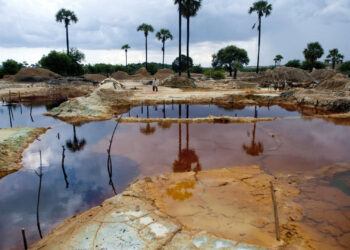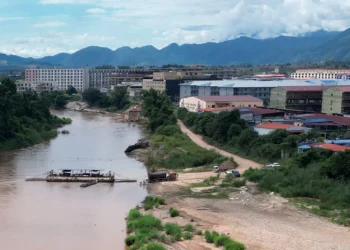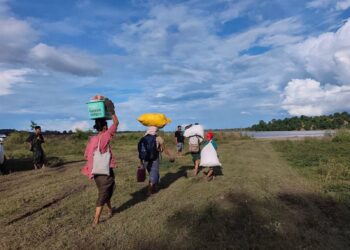As the military seeks to consolidate power, it is increasingly targeting journalists with lawsuits and violence in order to stop them from reporting the truth about what’s happening in Myanmar.
By FRONTIER
“Don’t be afraid of them,” The Hakha Times CEO Ya Lalawmpuia, also known as Pa Pui, advised his newsroom on March 3. “If we are afraid, we will not be able to reveal the truth about what they [police and soldiers] are doing.”
Less than a week earlier, on February 27, Pa Pui, 50, had been arrested in Hakha, the Chin State capital, while live streaming a protest.
“They [the police] beat me. I told them I was from the media, but they cursed and told me to stop talking nonsense,” he told Frontier. “They did not f*cking care – they threw me forcefully into the police truck.”
Pa Pui said more than 10 officers detained him, then took him to the Hakha Myoma police station and held him overnight. He was released at 2pm the following day.
“They forced me to sign an agreement not to livestream any protests or military deployments, which doesn’t make sense – I’m a journalist,” he said.
He signed the paper but told them he would not abide by the agreement.
“Although I signed the agreement, I told them I’ll keep covering protests without hesitation because it’s my job,” he told Frontier. “If I’d refused, I would have stayed in jail. I wanted to get out as soon as possible and get back to work.”
Hakha is home to at least six media outlets, as well as a handful of reporters for Yangon and Mandalay-based publications. Pa Pui is not the only one to be arrested: another journalist at The Hakha Times and a reporter for the Chinland Post were also detained and later released for reporting on the coup and the popular resistance to it.
The same day that Pa Pui was assaulted and detained, an even more brutal arrest took place in neighbouring Sagaing Region. Photos and videos showed police kicking and beating Monywa Gazette CEO U Kyaw Kyaw Win, before detaining him and smashing his mobile phone. Like Pa Pui, the 45-year-old had been livestreaming a protest in Monywa town at the time.
He was held for the night and released the following morning, and has been at home recovering from the beating since. A colleague told Frontier on March 3 he has sustained a crippling back injury and was suffering from chronic headaches.
“He cannot speak on the phone right now because he still gets dizzy spills,” Naing Soe, a Monywa Gazette reporter, told Frontier shortly after his release.
By March 15, Kyaw Kyaw Win had almost recovered from his injuries but had still not returned to work.
Although he was not wearing a helmet or vest identifying him as a reporter at the time of the beating, Naing Soe said it was obvious Kyaw Kyaw Win had been targeted because of his position at the town’s main newspaper.
“Monywa town is small and we all know who is who. They arrested our CEO intentionally,” he said.
Repression on the rise
Initially the military regime seemed to take a relatively soft approach to the media, with no mass arrests of journalists, shutdowns of media houses or re-imposition of censorship.
But as unrest and violence grows in the wake of the coup, the military regime seems to be increasingly targeting journalists with violence, arrest and lawsuits in an effort to stifle the ability of independent media to report what is happening in the country.
Thirty-nine foreign and Myanmar journalists have been detained between February 1 and March 15, of whom 22 have been released, 10 have been charged with incitement under section 505A of the Penal Code, and five remain in custody without charge. Most are being held at Insein prison, though the location of some remain unknown – even to their families – such as DVB reporter Ko Aung Kyaw, who was arrested in Myeik, Tanintharyi Region on March 2.
The section, which was introduced by the junta on February 14, makes it an offence to “cause fear, spread false news, agitate directly or indirectly criminal offence against a Government employee”, and carries a potential prison term of three years.
The 10 journalists include reporters or photographers from Myanmar Now, 7Day News, the Myanmar Pressphoto Agency, MCN TV News, The Voice, DVB, American news agency the Associated Press, and two freelancers. None have been allowed to see their lawyers or families.
Daw Nilar Khaing, the lawyer for Myanmar Now video journalist Ma Kay Zon Nway and 7Day News reporter Ko Aung Ye, who were detained while covering protests in Yangon last month, said police have not said why the two were charged, nor offered any evidence to support the charges.
“The head of the Sanchaung police station filed the lawsuit against Kay Zon Nway and the head of the Kamaryut police station charged Aung Ye Ko, but nobody can provide any information about the lawsuits [beyond that],” she said.
Both reporters appeared at their first court hearings via video conference on March 12, when they were both allowed to speak to Nilar Khaing and a relative. Aung Ye Ko’s next hearing is scheduled for March 24 at the Kamaryut township court and Kay Zon Nway’s for March 25 at the Sanchaung township court, both via video conference.
Police have told Nilar Khaing that she cannot meet in person with either of her clients, who are being held in Insein prison, because of the risk of spreading COVID-19. This means they’ve been unable to sign the documents needed to grant her power of attorney to represent them in court.
She criticised the decision to charge the reporters under 505A. “They were doing their jobs when they were arrested. They have the right to write, to broadcast and to cover the news. The lawsuits filed against them make no sense at all,” she said.
Editors at Myanmar Now declined an interview request from Frontier on March 3. The website has a reputation for being highly critical of the military, and was one of five media organizations that the Ministry of Information banned on March 8. Earlier that day, police and soldiers raided the investigative outlet’s downtown newsroom – the first in a series of newsroom raids targeting media organisations the regime deemed unfriendly.
Others banned include 7Day News, Mizzima, DVB and Khit Thit Media, while Kamayut Media’s offices were raided the following day, and its co-founder and chief editor were arrested.
Asked about the bans at a press conference on March 11, Deputy Minister for Information Brigadier-General Zaw Min Tun said it was because those outlets’ reporting “hurt the peace and stability of the country”.
“We don’t censor the media. The chair of the SAC, Min Aung Hlaing, recognises the media as the fourth pillar [of democracy],” he said. “But if their news and stories create protests and violence, we cannot help them.”
Fear and favour
But not every seems to be receiving the same level of scrutiny from the regime. On March 5, an Eleven Media reporter was arrested in the Mandalay Region town of Meiktila and released just a few hours later. The reporter, Wanna Soe, told Myanmar Now the day after his arrest that police did not realise he was a reporter when they arrested him, and released him shortly after learning he worked for Eleven Media – though he did say he was also made to sign an agreement before his release.
Some see this as evidence of favouratism. Eleven Media is perceived to be acting deferentialy to the military for following all the administration’s mandates that reporters not refer to the February 1 takeover as a coup, or to the military administration as a “junta” or “coup government”.
Additionally, when most Myanmar reporters and outlets refused to recognise the military government’s legitimacy by boycotting its first press conference on February 16, Eleven Media covered the event, even livestreaming it.
Frontier was unable to reach Wanna Soe or Eleven Media CEO Than Htut Aung for comment.
U Kyaw Min Swe, executive director of the Myanmar Journalism Institute, said many journalists and free press advocates perceived Wanna Soe’s relatively soft treatment as further proof that the regime is using lawsuits and violence to target those that report critically on it.
“Look who’s been [charged] and who’s been released; it shows that they are acting out of hatred [for particular outlets],” he said. “The military has done this in the past, but now it is getting worse.”
Read more on original source – Frontier Myanmar ( https://www.frontiermyanmar.net/en/the-militarys-war-on-journalists/ )






